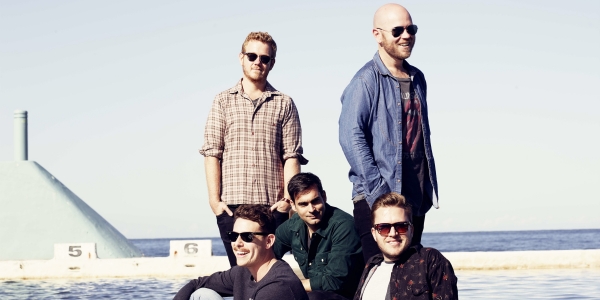“I think it’s [down to] the kind of album that we’ve made too,” he says. “Harlequin Dream is a bit more accessible than our first one, Moonfire. It’s a bit more of our own sound. Not saying we’re reinventing the wheel – obviously we’re not – but we feel a bit more comfortable in our own skin. It’s probably a little bit further away from that indie-folk thing, which was important to us because that wasn’t the direction we wanted to head.”
There’s been a lot of heated conjecture this year regarding the ramifications of the so-called ‘triple j sound’. Negative claims about the station’s corruptive influence on the local music scene seem exaggerated and somewhat misguided, particularly when you consider what else is on offer.
“I find it bizarre,” says Hart. “If you’re talking about homogenisation of Australian music, maybe the only reason you couldn’t blame commercial radio for that is because they don’t play enough Australian music. Other than that, the homogenisation of music in Australia is, to me, 100 per cent from commercial radio.
“If you actually broke it down and looked at the categories of music that [triple j] play – all the shows like Short.Fast.Loud and the roots program and even the hip hop program – they do cover quite a wide range of genres.”
The strangest feature of the recent public discourse has been the various musicians asserting that the health of their career rests solely on triple j support. “You can only play a certain amount of music,” says Hart, “and just because you don’t make triple j doesn’t mean that your music’s not valuable. I saw Whitley had a bit of a crack. I think Whitley’s really great but just because his new record didn’t get played, I don’t know that that means triple j are homogenising Australian music. It’s a bit of a far leap.”
The whole scenario basically reads like a classic case of tall poppy syndrome. Australia has a very influential national radio station that favours alternative-minded music, which isn’t the case in most other western nations. But positive chatter hardly makes for enthralling headlines. Anyhow, a sincere example of the youth broadcaster’s constructive impact is its ability to bring quality music to people all over the country, no matter how far removed they are from razzle-dazzle city life. Boy & Bear will soon undertake a 30-date regional tour, giving some love to the country’s less frequented areas.
“If you live in regional areas and you listen to triple j you want to see live music but you hardly ever get a chance,” Hart says. “When there’s something happening in town, everyone wants to be at it and that’s really exciting. You’ve got a show on every night of the year at the Enmore Theatre in Sydney but out at the Civic Theatre in Dubbo you might only have a show every couple of weeks that you’re interested in seeing. But they’re still really knowledgeable crowds so if you don’t put on a good show they’re going to know.”
Unlike locations such as America and Europe, bands don’t often go on tours through regional Australia until they reach a certain extent of recognition. Even if it isn’t the most lucrative venture, Hart emphasises how significant it is for Boy & Bear to take their music all around the country.
“When we did uni they taught us that Australia is two per cent of the world market when it comes to the music industry. But, for us, it’s our country, you know? It’s really important to us that we be out touring regardless of what the risk is. You play to a half full room with the knowledge that you’re going to lose money on the show, but it doesn’t matter. It’s just important that you’re there. You try to give back to the people that have supported you all along – those people that voted for you in the hottest 100 and who just enjoy the music.”
The diminutive size of the Australian market often deters musicians from advancing beyond the major cities. Nationwide radio play obviously enhances any band’s prospects, thus regional areas shouldn’t be ignored. “The reality is touring costs a lot of money,” says Hart. “When you’re starting out there’s little to no returns – in fact, you’re investing into it. The support of triple j and community radio really help to give you a platform with which to tour. It’s disappointing when bands do get established and they choose not to do regionals and you just see them doing six dates around Australia. That’s when I think there’s no excuse for it.”
BY AUGUSTUS WELBY

